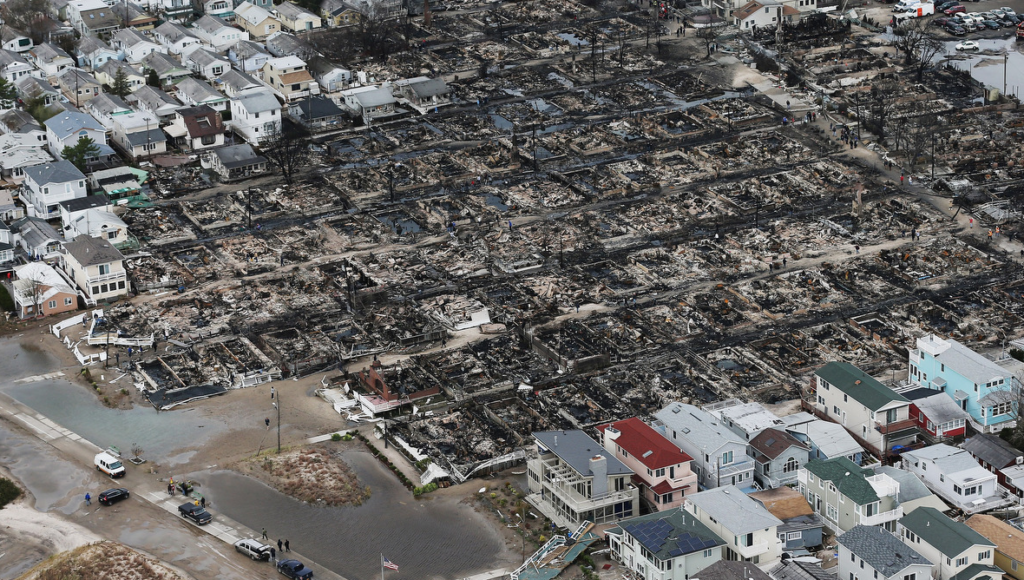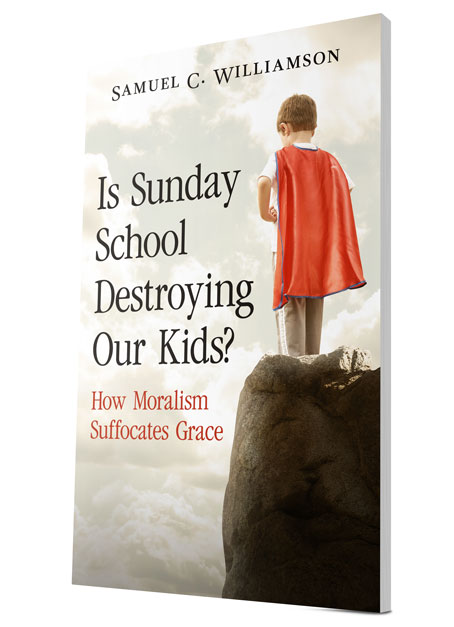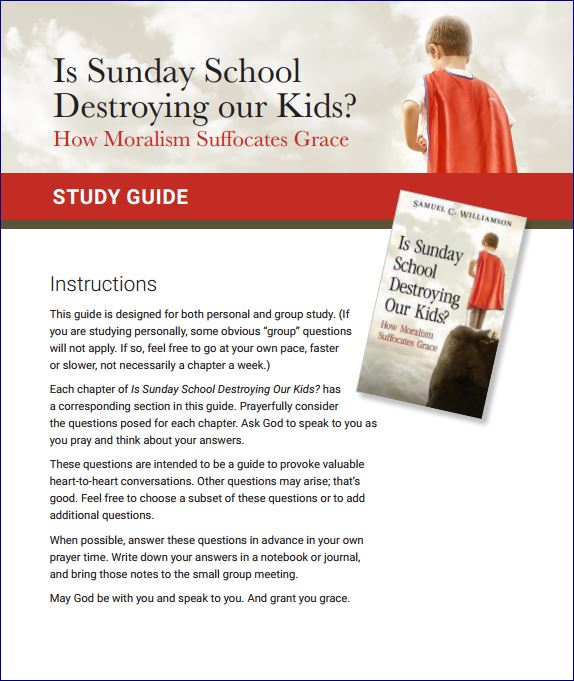Hurricane Sandy was the second most devastating hurricane in United States history. On October 29th, 2012 it stormed ashore in New Jersey, leaving a wide wake of destruction. But the destructive path seemed random and arbitrary. Huge clusters of homes were annihilated while houses right next door were left unscathed.

A week after the hurricane, I saw a post on Facebook. It showed the picture of a man standing in front of his unharmed house, while the scattered remains of his neighbor’s house lay completely destroyed by the storm. Under the picture was this caption:
The LORD’s curse is on the house of the wicked,
but He blesses the home of the righteous (Pr. 3:33).
I never met the man and I don’t know his heart. I hope his insensitivity was simple naiveté, and that the judgment of his neighbor was unintentional.
But it smacked of smugness. It reminded me of the ugliness of religious-righteousness.
Can “Righteousness” Be Ugly?
Almost everyone dislikes “self-righteousness,” but “religious-righteousness” is simply self-righteousness with a dash of religion. It oozes the arrogance of inner self-goodness as it scorns the evils of the less fortunate; it takes credit for personal success while it altogether forgets grace.
True kingdom living nurtures humility, “I can’t do it on my own—even be good.” And if I can’t do “it” on my own, how can I scorn anyone else who also can’t?
Verses like “God blesses the righteous” are prescriptions for hope in God’s power; they are not diagnoses of our own moral greatness. When we use external circumstances to quantify our goodness, we snub others with our graceless judgments.
Or—if the circumstances are negative—we despair. I personally know real believers who recently experienced terrible losses:
- A man who lost his son to a brain tumor
- A woman who lost her husband in a freak accident
- A friend stricken with a congenital nerve disorder
Did they lose their son, husband, or health because of their evil deeds while you and I prosper because of our goodness? Were they faithless while you and I were faithful? (Are we really that good?)
When we use verses of blessings to praise our superlative natures, we are insensitive, mean, and ugly. Jesus said, “God causes his sun to rise on the evil and the good, and sends rain on the righteous and the unrighteous” (Matt. 5:45).
Maybe our good circumstances have nothing to do with our goodness. Maybe (just maybe) God is showing us mercy.
Let’s Strive to Be Good
The law tells us how to live, how to strive for godly character, and the world dislikes that sentiment. It smacks of moralism. But the world is filled with violence, oppression, brutality, and treachery. The world suffers because people do not strive for goodness.
We should teach, preach, cajole, and encourage everyone to live morally, full of goodness.
But it won’t be enough.
The Hidden Purpose of The Law
Our feel-good, therapeutic view of the world—I’m Okay, You’re Okay—will dislike the second purpose of the law even more than the first. First the law tells us how we are supposed to live, and then it tells us how we can’t do it on our own. One writer said:
The Law is a mirror to show people what they are like. The foolish idea that a person can be holy [or righteous or good] by oneself denies God the pleasure of saving sinners.
God must therefore first take the sledge-hammer of the law in his fists and smash the beast of self-righteousness and its brood of self-confidence, self wisdom, self-righteousness, and self-help.
When the conscience has been thoroughly frightened by the Law it welcomes the Gospel of grace with its message of a Savior who came … to preach glad tidings to the poor, to heal the broken-hearted, and to grant forgiveness of sins.
Few people seriously admit their own contribution to the evils in the world. I’m told that Hitler thought himself a pretty good guy. Using the law as a mirror to reveal our inadequacies will drive us to God for his grace.
If using the law as a mirror simply makes us humbler, the world will be a better place.
The Beauty of Gospel-Righteousness
Tim Keller says, “Jesus came to live the life we should have lived and to die the death we should have died.” Jesus didn’t come just to die for us. He also came to live for us.
That means Jesus perfectly lived a life of love, holiness, obedience, and righteousness. In his righteousness, though, he didn’t scorn us. Instead he poured out his goodness into us. When God looks at us, he literally sees the goodness and righteousness of Jesus.
Therefore, we can stand confidently in righteousness, but we stand humbly because it isn’t self-righteousness. Even righteousness is a gift, and that “gift” is the law of grace.
If grace rules, all circumstances can bring peace. If our house escapes the next storm, we rest in His righteousness. If our house is flattened in the storm, the resurrection teaches us that God brings the deepest joys out of the darkest nights.
It’s all grace.
Sam
++++++++++++++++++
This post is an excerpt from my book, Is Sunday School Destroying Our Kids. People in the world often reject Christianity simply because they can’t distinguish it from mere morality.
The world needs morality–oppression thrives when consciences are abandoned–but we need more than morality alone. We need the gospel of grace. A gospel that has largely been lost amid the dos and don’ts and preoccupations of religious culture.
Join thousand of other readers who have delighted in this short, story-filled, thought-provoking book on grace.
The book is accompanied by a twelve-week Study Guide, filled with questions for reflection and exercises for growth; perfect for small groups or personal meditation. To download free Study Guide, Click Here (or on the image to the left).
Click here for a PDF of commonly asked questions about this book: Frequently Asked Questions



 When Our “Needs” Become Our Lords
When Our “Needs” Become Our Lords
It has been ages since I first had the great satisfaction of serving as your editor on “Sunday School,” Sam. I remember my thrill as I read into it and thought, “Oh, my gosh! Yes! This brother . . . a kindred spirit!” (Even now, you merit three consecutive exclamation marks.) Reading this excerpt is SO refreshing. It’s a blessing just to know you walk this green earth, my friend.
I appreciate the quote from Luther, Sam. It is one of the most succinct explanations of why grace is so precious. On the other hand, I agree that the posting you mentioned smacks of judgment and even a bit of “Neener, neener, God loves me better.” We can certainly thank God for protection and give Him the glory, but not in a way that is more like pepper than salt.
And one last note: Sometimes people are made sick as a punishment for unrepented sin. That is why James says, “And the prayer of faith will save the one who is sick, and the Lord will raise him up. And if he has committed sins, he will be forgiven. Therefore, confess your sins to one another and pray for one another, that you may be healed.” James 5:15-16. I think Revelation 2:21-22, and 3:19 are examples. Thanks, and it is good to see something from you again.
What a great message, Sam. Sadly, Christians often beat up others with scripture, forgetting about the grace and mercy we are granted.